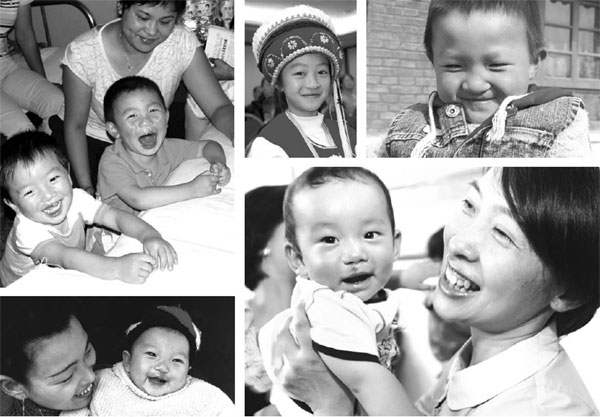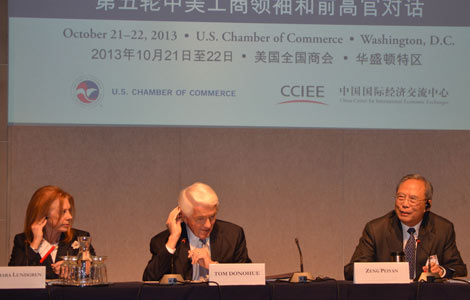Driven by smiles
Updated: 2013-10-24 07:35
By Liu Zhihua (China Daily USA)
|
||||||||
Poor kids born with cleft lip and palate in China are getting a new chance for a happy life, thanks to a charity launched by a Chinese-American executive, Liu Zhihua reports.
American businessman Charles Wang probably never imagined that his good will would have the power to change the destiny of hundreds of thousands of families in China.
But it happened.
Smile Train, a charity initiated and co-founded by Wang, the tech entrepreneur who owns the New York Islanders hockey team, helps to repair cleft lips and palates for poor children in developing countries.
|
Happy smiles are back on the faces of these children who are beneficiaries of Smile Train, a charity pledging to repair cleft lip and palate for poor children in developing countries. Photos provided to China Daily |
Since it came into China in 1999, the charity has provided about 300,000 free surgeries to Chinese children from poverty-stricken families, through partnership with 397 local hospitals.
Across the world, it has provided free surgeries to nearly 1 million children.
Cleft lip and palate is a congenital condition that usually develops early in a pregnancy, as a fissure in the upper lip and mouth. The disfigurement often means children suffer from bad nutrition, since eating is difficult, and they are often shunned by and separated from others.
A simple operation can easily repair the deformity. But each surgery costs about 7,000 yuan ($1,150), an impossible sum for poor families.
"We know the problem, we have a cure for it, and yet we still have children that suffer from it," says Wang, one of the driving forces behind Smile Train.
"We don't want to see any child born with a cleft that goes untreated in the world."
For Tibetan Dorje, there is no way to express his gratitude to Smile Train and the West China Hospital of Stomatology in Chengdu, Sichuan province.
When his son was born with a cleft lip, it was local religious belief that it was retribution for sins the son had committed during a previous existence. By tradition, therefore, the family was doomed to endure the tragedy without complaint.
"It pierced my heart that my son could not smile like other babies," says Dorje. "I couldn't take him out to play, or to religious ceremonies for blessing. I don't want my boy to be judged, and others to stare at him and make me feel ashamed."
Dorje decided to cure the boy at all cost. Living in the remote area of Dzachuka in the southeast of Qing-hai-Tibet Plateau in Sichuan province, the family makes a meager income, and Dorje borrowed about 20,000 yuan to seek medical help in the nearest big city, Chengdu.
The city is 1,070 kilometers away.
A trip between the two places usually takes three days and two nights, and costs about 3,000 yuan, which is almost a year's income for residents in Dzachuka.
The father and son arrived in Chengdu only to find that they didn't understand Mandarin, and knew no one to turn to.
Wandering in the city for days, they failed to find a hospital that would take such a young boy in. Soon they had spent all the money they brought along.
Back home, the family had no other way to make money to satisfy creditors, and they even started to dig caterpillar fungus in mountains where Living Buddha had warned them not to climb in fear of offending the god.
But the caterpillar fungus didn't sell well, and they were trapped in debt. The turning point came when two young women they didn't know visited Dorje's home, saying they could help the boy.
The surprise visitors were sisters. The older one was Traga Lhamo, and the younger one was Yeshe Lhamo, who both work in the county government. They had enabled another family in Dzachuka to travel to Chengdu for free surgery funded by Smile Train. Now, they were eager to help as many children as they could.
People living in Dzachuka make a living by pasturing in the vast grassland, and the sisters visited one tent after another to look for families that need help.
In the end, they gathered 17 children with cleft lips and palates, including Dorje's son, and all of them had successful surgeries at the West China Hospital of Stomatology.
"Smile Train changed those kids' life," says Traga Lhamo, the older sister. "The doctors and nurses in the hospital were very nice and supportive."
Now, Dorje can't help smiling when his son smiles.
Wang Li, 25, from Suqian, Jiangsu province, was one of the first children who benefited from the Smile Train program.
She had free surgery 14 years ago, and lives a normal life today. She got married in 2012, and has given birth to a healthy son.
But as a little girl, she used to avoid crowds because of her cleft lip, and always wrapped her face with a scarf when she went out.
Wang once told the media she couldn't imagine how her life would be without help from Smile Train.
With established programs in 87 countries, the charity not only provides free surgeries to children, but also trains local doctors and provides equipment to hospitals to perform cleft operations.
So far, Smile Train has trained more than 20,000 medical staff members across the world, including 12,000 in China.
"Many people asked me 'Why cleft?'," says Wang, the chairman of the charity, who was born in Shanghai and emigrated to the US with his parents when he was 8. "The thing is, when the kids make fun of a kid with cleft, the psychological damage is unbelievable.
"We do one thing and we focus. We put a smile back on a child's face."
Contact the writer at liuzhihua@chinadaily.com.cn.
Contact Smile Train at 800-810-0059.
(China Daily USA 10/24/2013 page9)
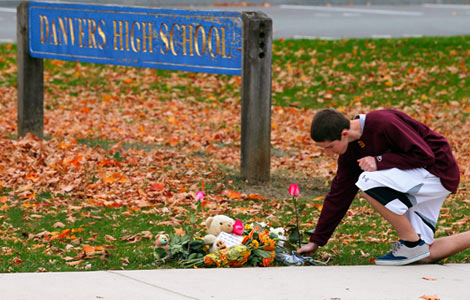
 Mass. teacher slain; 14-year-old student charged
Mass. teacher slain; 14-year-old student charged
 Latin American clown convention
Latin American clown convention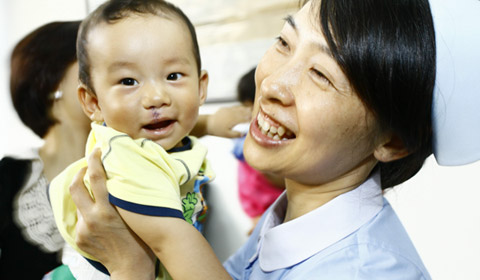
 Driven by smiles
Driven by smiles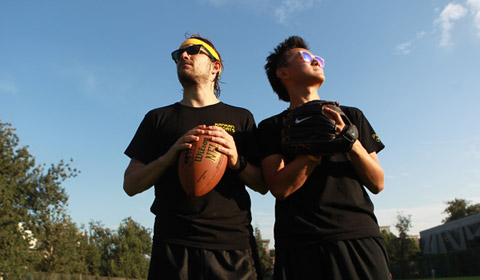
 Camp gives sporting chance for students headed overseas
Camp gives sporting chance for students headed overseas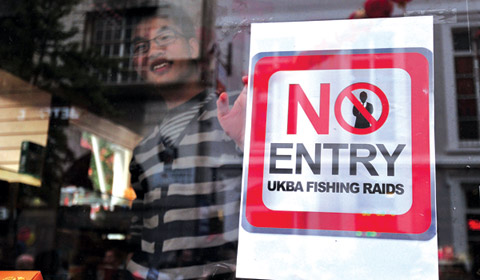
 Chinese protest UK 'fishing' raids
Chinese protest UK 'fishing' raids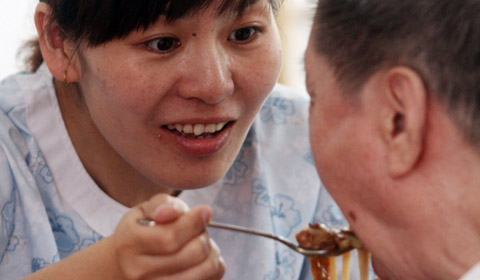
 Caretakers in need of counseling
Caretakers in need of counseling Pumpkin fun ahead of Halloween
Pumpkin fun ahead of Halloween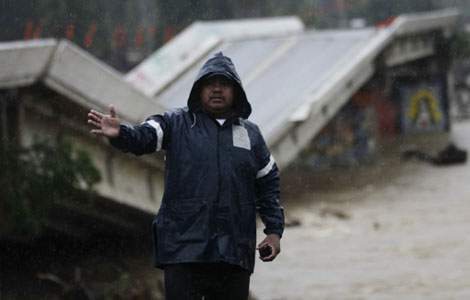
 Weakening Raymond soaks Mexico, no serious damage
Weakening Raymond soaks Mexico, no serious damage
Most Viewed
Editor's Picks

|

|

|

|

|

|
Today's Top News
China's GDP growth to 7.6%: Standard Chartered
Scholar looks at the kung fu-hip hop connection
Mobile giants talk future in Frisco
Starbucks' pricing furor: tempest in a coffee pot
100,000 Strong student exchange picks first partners
Report: China could profit rebuilding US
US-China trade talks a 'turning point'
Steady growth the goal for GDP
US Weekly

|

|
